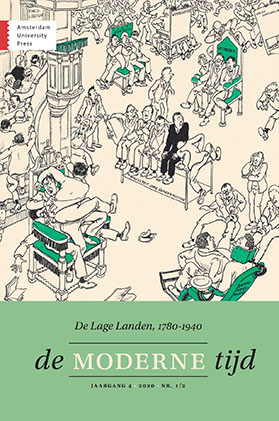Tom Sintobin en Leonieke VermeerOver universitaire culturen, toen en nu 2-17
Jaap GraveJohannes Franck. Een carrière in de marge 18-35
Abstract (EN)
Johannes Franck. A career in the margins.Johannes Franck (1854-1914) was the first professor extraordinarius (1886) and in 1912 a professor of Dutch and Low German in the German empire. In this article I describe his career largely until 1886 by embedding him within the scientific community of his time. Subsequently, I show how anti-Semitism prevented him from becoming a professor of German studies and discuss the policy of appointments in Prussia. To conclude, I argue that these aspects and the difference in scientific cultures between the Netherlands and the German Empire was partly responsible for the fact that he had a marginal position in between two scientific communities.
Christiaan EngbertsEen taalkundige als internationaal ondernemer. M.J. de Goeje en de Annalen van al-Tabari (1872-1901) 36-54
Abstract (EN)
A linguist as international entrepreneur. M. J. de Goeje and the Annals of al-Tabari.Modern-day scientists and humanities scholars are often expected to possess personality traits, skills, and virtues typically associated with entrepreneurs. These include (but are not limited to) a willingness to take risks, the ability to lead a diverse team of collaborators, and a flexible mindset. The roots of the ideal of the entrepreneurial scholar, however, are older. In this article, I investigate the realization of Michael Jan de Goeje’s al-Tabari edition in the last decades of the nineteenth century. To finance this ambitious endeavour and to successfully gather and manage a team of scholarly and non-scholarly collaborators, De Goeje needed to possess all the traits, skills, and virtues mentioned above. This case study demonstrates how an entrepreneurial spirit could be an asset for ambitious nineteenth-century scholars. At the same time, it illustrates one of the ways in which seemingly modern ideals of scholarship build on existing ones.
Ruben Mantels‘Ik leef hard en dubbel’. Het academisch leven van Paul Fredericq omstreeks 1900 55-69
Abstract (EN)
‘To live a double life’. The academic life of Paul Fredericq around 1900.In this article I analyse the diary of the historian Paul Fredericq following the concept of ‘academic life’, a term coined by Johan Huizinga and further explored by Klaas van Berkel. It calls for the study of the university that goes beyond the institutional, perceiving the university as a living community with multiple interactions with society. Personal documents such as the diary of Fredericq prove to be excellent sources to this informal, anthropological view on the university. The diary reveals how the ‘personal’ life and the ‘university’ life of Fredericq intertwined and how his research and teaching was mixed up with engagements in the Flemish Movement, liberal politics and cultural world. In his diary he spoke about a double life, namely this combination of being a scientist and being a public figure. To conclude, this article discusses Fredericq as a case of the responses and concerns of universities around 1900 to the growing extra-curricular activities of the academic community.
Petra van Langen‘Er zijn voor dit vak in Nederland geen maatschappelijke vooruitzichten’. Muziekwetenschap in Utrecht, 1930-1940 70-87
Abstract (EN)
‘There are no societal prospects for this study in the Netherlands’. Musicology in Utrecht, 1930-1940.Musicology became a fully-fledged academic study in the Netherlands in 1930 when both the Chair in Musicology and the Institute for Music History were founded at Utrecht University. Using sources such as archives, newspapers, personal memories of old studies in letters, and a talk on the occasion of the 50th anniversary of the institute, this article describes the history of musicology Utrecht, its curriculum and what the first professor in musicology Albert Smijers expected of his students in the first decade of the institute’s existence.
Jamilla NotebaardDe kunst van het geprojecteerde beeld. De projectielantaarn als didactisch instrument in de kunsthistorische lessen van Willem Vogelsang (1875-1954) 88-107
Abstract (EN)
The art of the projected image. The optical lantern as a didactic instrument in the Art History lectures of Willem
Vogelsang (1875-1954).The optical lantern was the central medium through which Art History professor Willem Vogelsang (1875-1954) taught his students ‘how to see’. As the first ordinarius in Art History in the Netherlands, Vogelsang focused on creating the right educational setting to turn his students into professional art historians. In his lectures the optical lantern and its projected images functioned as a didactic instrument to make his students (visually) understand compositional and stylistic differences and similarities within and between artworks. The lantern allowed Vogelsang to visually open up the world of art history to a whole new generation of art historians.
Dirk AlkemadePak van SjaalmanPatriots oorlogstoerisme. Het reisverslag van Jan van Vleuten naar de frontsteden Utrecht en
Woerden in de zomer van 1787 108-120
Boekzaal der geleerde wereld 121-143
- Pieter Huistra, Bouwmeesters, zedenmeesters. Geschiedbeoefening in Nederland tussen 1830 en 1870. Nijmegen: Vantilt, 2019. (Christiaan Engberts)
- Beatrice de Graaf, Tegen de terreur. Hoe Europa veilig werd na Napoleon. Amsterdam: Prometheus, 2018. Christine Haynes, Our friends the enemies: The occupation of France after Napoleon. Cambridge, MA: Harvard University Press, 2018. (Matthijs Lok)
- Laurien Hansma, Oranjedriften. Orangisme in de Nederlandse politieke cultuur, 1780-1913. Hilversum: Verloren, 2019. (Lauren Lauret)
- Xosé M. Nuñez Seixas en Eric Storm, red., Regionalism and modern Europe. Identity construction and movements from 1890 to the present day. Londen: Bloomsbury, 2019. (Marguérite Corporaal)
- Leo van Bergen, Pro Patria et Patienti. De Nederlandse militaire geneeskunde 1795-1950. Nijmegen: Vantilt, 2019. (Tom Duurland)
- Len de Klerk, Frédéric en Antoine Plate. Rotterdamse kooplieden, reders en bestuurders, 1802-1927. Hilversum: Verloren, 2019. (Ben de Pater)
- Ron Dirven, Monique Rakhorst en Helma van der Horst, De schilders van Dongen; Ulbe Anema, Jeroen Kapelle en Dick van Veelen, De schilders van de Veluwezoom; Annemiek Rens, Barbizon van het Noorden. De ontdekking van het Drentse landschap, 1850-1950. Zwolle: WBOOKS, 2019. (Wiepke Loos)

